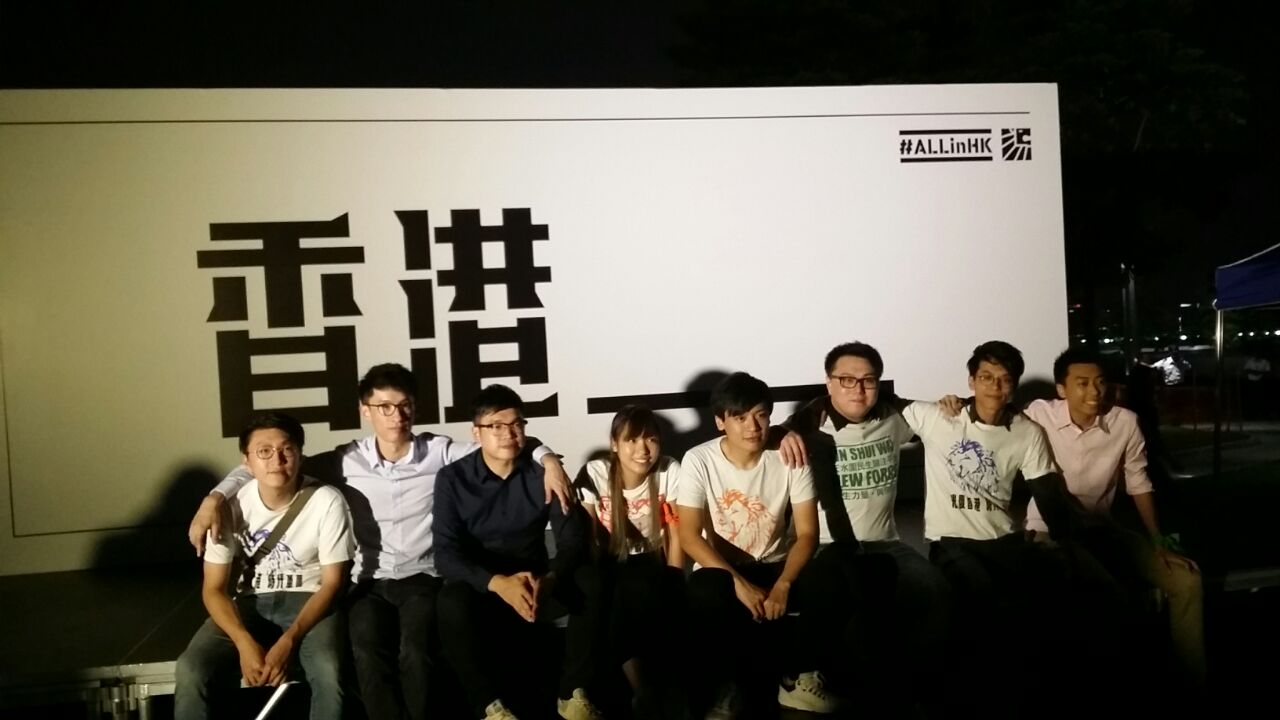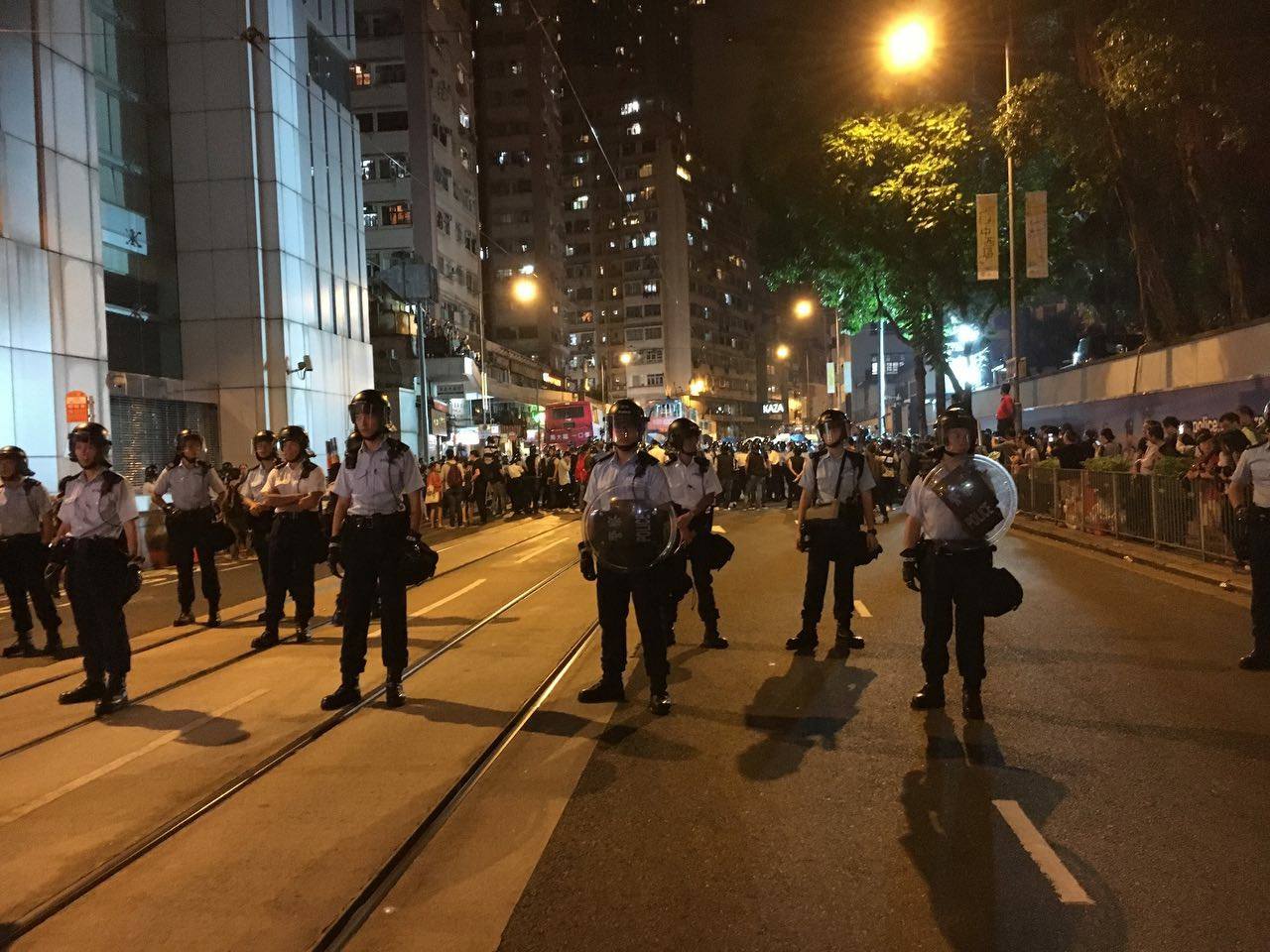by Brian Hioe
語言:
English
Photo Credit: VOA
HONG KONG would seem to be in the streets again, with a demonstration Sunday against Beijing’s intervention into Hong Kong legislature which saw over 13,000 participate, according to organizers. Namely, Beijing has ruled to bar pro-independence legislators-elect Yau Wai-Ching and Sixtus “Baggio” Leung from taking office after a political crisis prompted by their refusal to properly take oaths to be sworn into office. Protest on Sunday saw four arrests and numerous clashes with the police. Demonstrations on Saturday outside the liaison office also numbered in the thousands.
Yau and Leung’s oaths were seen as offensive to China, with both perceived as having pronounced China as “Sheena,” seen in line with the derogatory term “Sheena” used against China during the Japanese colonial period. Yau also referred to the “People’s Refucking of Sheena,” rather than the “People’s Republic of China.” Though Leung and Yau were not the only legislators who took their oaths improperly as a means of protest against Beijing, as newly elected young localist candidates who had expressed pro-independence views in the past, their led to the pro-Beijing camp leveraging on the incident and attempting to prevent them from being sworn into office, despite Leung and Yau being democratically elected legislators.
Yau and Leung are both members of Youngspiration, one of the newly formed localist political parties founded after the Umbrella Movement, which rose to prominence along with other localist groups after the “Fishball Revolution” that occurred in February 2016. Yau and Leung were both elected during 2016 LegCo elections as legislators of the Kowloon West and New Territories East constituencies, respectively. Yau and Leung have attracted media attention because of their youth, Yau being 25 and Leung being 30, though other non-localist candidates who entered politics following the Umbrella Movement as Demosistō’s Nathan Law are also quite young, Law being the youngest elected member of LegCo in history at age 23. Tension between post-Umbrella groups continued during demonstrations, however, with differences in the courses of action advocated between different groups.
Out Of A Longer Controversy
IN THE LEAD-UP to 2016 elections, localist, pro-independence candidates as Hong Kong Indigenous’ Edward Leung were banned from participating in elections. Before the equivocal banning of localist candidates as Leung and others, there was much uncertainty about loyalty oaths to China that legislative candidates would be made to sign. Seeing as such oaths contained swearing loyalty to China and not advocating separatism, localist candidates who had previously expressed pro-independence views tried to run while avoiding signing oaths or played down previously expressed political views.
But Leung and others would not be allowed to run despite signing oaths anyway. It remains somewhat of a mystery as to why some localist candidates and not others such as Yau Wai-Ching and Baggio Leung were banned, however. Edward Leung and Hong Kong Indigenous later threw his support behind Youngspiration and other localist groups which allied through the ALLinHK electoral alliance which coordinated by Youngspiration, naming Baggio Leung as his replacement candidate and campaigning on their behalf. In a previous by-election which Edward Leung participated in and lost, he attracted 65,000 votes, indicating substantial social support behind Leung before elections, and the victory of Yau Wai-Ching and Baggio Leung confirmed that localists had enough social support to be elected to LegCo, despite being a new force in Hong Kong politics.
 Localist candidates gathered on election night. Photo credit: Youngspiration
Localist candidates gathered on election night. Photo credit: Youngspiration
But if the present controversy comes in the footsteps of previous drama about oath taking and the banning of localist candidates from running in elections, it would be a different matter that Yau Wai-Ching and Baggio Leung were already elected, but Beijing has invalidated the results of elections. What to do about Yau and Leung at one point became a matter of conflict between the leadership of Hong Kong’s legislature and executive branches of government, despite both being headed by pro-Beijing political actors, namely Andrew Leung and C.Y. Leung, and leading to a rare intervention of the Hong Kong judiciary into legislature. But a legal injunction left Hong Kong’s judiciary unable to resolve the legal conflict of interpreting Hong Kong’s mini-constitution of the Basic Law to resolve whether Yau Wai-Ching and Baggio Leung should be allowed to retake their oaths and enter office, leading Hong Kong’s judiciary to appeal to China’s National People’s Congress to resolve the situation. Unsurprisingly, the National People’s Congress voted unanimously that Yau and Leung should not be allowed to enter office.
This represents the further erosion of democracy in Hong Kong under Chinese rule. Despite that Hong Kong’s Basic Law enshrines some measure of autonomy for Hong Kong which should not ordinarily allow for Chinese intervention on such a constant basis, since Hong Kong reverted to Chinese control after the British handover in 1997, the space for democratic freedoms in Hong Kong has increasingly shrunk. Yet Beijing’s direct intervention into Hong Kong’s legislature still comes as a shock, seeing as this is the most direct intervention by China in Hong Kong’s political affairs since 1997. It is now feared that Beijing’s interpretation of the Basic Law may allow for the removal of any lawmakers that the Hong Kong government deems undesirable. Even lawmakers not calling for Hong Kong independence, but simply for greater self-determination for Hong Kong, may be disqualified from legislature.
Questions About Localism
THE IRONY OF the matter may be that, as with the meteoric rise of the previously marginal position of Hong Kong independence since the February 2016 “Fishball Revolution” when it was largely an unheard of position even during the 2014 Umbrella Revolution, China has largely fanned up the flames of protest against itself in Hong Kong. Had not Yau and Leung added what were perceived to be offensive terms referring to China into their legislative oaths and then the pro-Beijing camped leapt onto the matter as a matter for political grandstanding, they would have been allowed to enter legislature as normal legislators.
Opposition to Yau and Leung does not seem to have been orchestrated beforehand by the pro-Beijing camp and the Hong Kong judiciary likely would not have appealed to Beijing about whether localist pro-independence politicians as Yau and Leung should be allowed to enter legislature if not for the oath taking controversy and the media frenzy which ensued. To give a sense of the amount of cognitive dissonance involved in the controversy behind the scenes of Hong Kong political establishment, before the oath taking, Yau and Leung, in fact, already had moved into offices in the LegCo building before the onset of political drama that would lead to their being disqualified from office. Despite being not allowed to enter the LegCo chambers and being removed by security on numerous occasions they have tried to force entrance to into LegCo chambers with the aid of political allies, and although rumors of by-elections being covertly organized by the Hong Kong government to replace Yau and Leung have swirled for weeks, Yau and Leung seem to have been allowed to continue using these offices during the present controversy, at least until the recent ruling by China’s National People’s Congress.
And it is to be questioned what Yau and Leung would have done in LegCo to begin with. Many in Hong Kong did not agree with Yau and Leung’s actions during their oath taking ceremonies, seeing this as offensive and childish, including among the pan-democratic camp. It is a question as to whether Yau and Leung would simply have used their membership of LegCo to stage media stunts with little political substance, in spite of having run a successful electoral campaign in order to gain entrance to legislature. Otherwise, it is also possible that rather than heralding any change in legislature,Yau and Leung would have simply become absorbed into the status quo of pan-democratic versus pro-Beijing politics in LegCo.
Despite that the implications for democracy in Hong Kong are grave, much of the present controversy strikes as a product of political theater, hyped up by the media. As evidenced long before Yau and Leung’s actions, it remains to be seen whether localism is a lasting phenomenon, or one which has been overinflated by the media. With the prominence of Yau in particular in recent media coverage as an outspoken, young female politician, this comes on the heels of a long series of figures elevated to prominence by media as purported representatives of Hong Kong youth politics, including Edward Leung of Hong Kong Indigenous and Joshua Wong and Nathan Law of Demosistō.
Going Forward
IN TRUTH IF protest is only set to grow in Hong Kong, it is not necessarily that the majority of demonstrators are in support of Hong Kong independence. It is not necessarily that demonstrators are in support of Leung and Yau either. It strikes as the majority of protestors are angry at Beijing’s direct intervention into Hong Kong politics, and this is what has galvanized individuals onto the streets of Hong Kong once again. But it may be that present events lead a greater number of individuals to take previously marginal positions as Hong Kong independence more and more seriously. As we see with both the current oath taking controversy and its previous handling of events, the rise of localism has mostly been a product of China coming in with an iron hand and provoking widespread outrage, when a velvet glove approach might have been more suitable to its purposes.
Yet at the end of the day, perhaps it should have been that demonstrators realized much earlier that ever since the British handover that China was not going to allow Hong Kong to run itself according to its own rules or think that China would allow Hong Kong residents more freedoms than than residents of China if it considered Hong Kong part of China. One has repeatedly heard claims in the media and in political commentary that China’s latest action infringing on Hong Kong freedoms marks the death of “One Country, Two Systems” many times already, whether this was said about the Umbrella Movement, the Fishball Revolution, the banning of localist candidates from running in 2016 legislative elections, or now the refusal to allow victorious localist candidates from actually entering legislature. This should already be common sense.
 Photo credit: Yau Wai-Ching
Photo credit: Yau Wai-Ching
Hong Kong’s system of government would have been fundamentally flawed to begin with, given that they are questionably democratic to begin with, in allowing corporations and vested economic interests a seat at the table alongside democratic elected representatives through non-publicly elected “functional constituency” positions. But, even then, blind faith in Hong Kong’s legal system by way of the Basic Law to defend Hong Kong’s democratic freedoms was unwarranted from the beginning. Because whatever the Basic Law or any other says in Hong Kong, in the end, it is China that holds all the cards, and the interpretation of the law will bend in China’s directions. At the end of the day, Hong Kong’s government institutions are ultimately controlled by China, and so one cannot really expect otherwise from attempts to air political dissatisfaction within government to begin with.
In this way, present outrage reflects that the question of democracy in Hong Kong has been unsettled for a long time, not even going back to to the Fishbowl Revolution, Umbrella Movement, or even the British handover, but long before that. It remains to be seen as to the future of Hong Kong, then. As such, taking to the streets may be what little recourse that residents of Hong Kong may have to express their dissatisfaction with the present state of affairs. And protest will undoubtedly grow, given the continually heavy-handed nature of China’s responses. So we may see many repeats of Saturday and Sunday’s events in the near future. Hong Kong’s long night may just be beginning.

